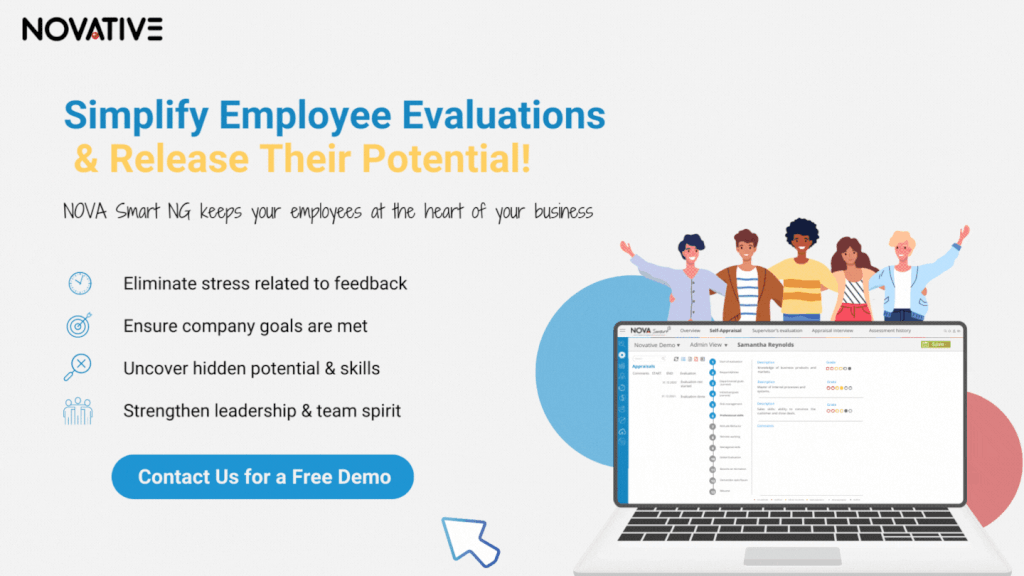Employee evaluation is a tool used by organizations to better understand their workforce. These evaluations give managers the chance to learn more about each employee’s strengths and limitations. This way, your employees will be able to best utilise them in the workplace and boost their performance in the future.
Businesses are now more likely to implement systematic, frequent performance reviews rather than an annual one. Conducting regular employee evaluations will help workers to stay on the same page with their managers. It is also a great reminder of what the supervisors expect in the workplace.
An effective employee evaluation results in a more dedicated and motivated workforce. In this article, we outline tips for a productive review that would help you retain your employees:
#1 Build Trust
Employees must first feel a true sense of connection and trust with their leader before talent potential can be harnessed. Nowadays, a lot of employees work from home or have hybrid work schedules. In this context, trust is more important than ever.
A remote team must trust each other. In most cases, poor communication leads to poor collaboration.
Hosting regular, informal communication will help the company to build an informal substructure of trust.
#2 Employee Evaluation Should Happen Frequently
Employee evaluation generally occurs once a year and are related with pay increments.
A whole year of work summed up in one meeting? It can be tedious for your supervisors and intimidating for your employees. For this reason, yearly employee evaluation might miss the mark in conveying clear critiques and adjustments.
They should be combined with regular employee evaluation. Regular meetings with your employees are an extraordinary way for making a continuous adjustment cycle, where employees aren’t left wondering how they’re doing.
Regular reviews likewise permit managers to set goals and objectives for workers. Managers & HR can assess how every worker’s performance lines up with individual and departmental objectives.
Also, managers can more easily distinguish between those who try to solve challenging situations and those who don’t care about their responsibilities.

#3 Prepare Your Managers and Employees
Organisation can prevent numerous performance issues by guaranteeing that two-way discussions happen among managers and workers. This way, everyone has a total understanding of what is required and expected.
Discipline shouldn’t be used unless a clear route to achievement is established and effectively conveyed to your employees. You don’t want to punish an employee for something they have no control over. If you have to discipline an employee, ensure that you are using facts and have written justification. If not, it could affect your entire workforce and lead to a bad work atmosphere.
Another way to ensure that managers and HR are properly prepared for the effective employee evaluation process is to provide them with a smart software. A performance tracking system helps your team to set goals in an effective way, follow the interviews and create relevant reports.
#4 Transparent Rewards and Recognition
On the other side, workers who accomplish exceptional work merit acknowledgment. They are the workers who continuously go above expectations, the ones that supervisors rely upon and generally take in more tasks than others.
Numerous managers think these workers are OK with proceeding with their responsibilities without complaint. This isn’t the right methodology. Managers should start open discussion to discern whether these employees are near burnout or not. If an employee is regularly exceeding expectations, they deserve to know about it and be rewarded for it.
An effective employee evaluation permits you to discuss these contributions and to discuss what that employee sees as fair pay for an extraordinary performance. Giving your employees recognition and rewards can work to improve overall performance.
By finishing the review, you’re ready to acknowledge your employees’ effort and reward them more frequently. Results will be visible in employee performance.
#5 Work on a Consistent Strategy
An absence of strategy and rules for the employee evaluation leads to bias. You should start by creating a clear and well-defined review structure and provide training on performance review. Such a content will allow supervisors to properly prepare and accurately follow the assessment process.
Employee evaluations that are mishandled can also be very disruptive to your workplace. Evaluations should be a benefit for both employee and employers. A well-structured evaluation process improves employee retention. When your employees are given clear goals, open lines of communication, and reward systems, they are happier, more engaged, and more productive.
#6 Focus On The Essentials for Your Regular Evaluations
An annual review is generally long because it’s conducted once per year.
Weekly or monthly meetings with employees are less stressful and less-time consuming. Those employee evaluations should focus on a single topic instead of being general.
Last but not least, you should make it objective, an evaluation process without explicit and quantifiable goals tends to wander aimlessly.
#7 Highlight Strengths and Improvements
An effective employee evaluation process is not just about observing employees’ strengths and weaknesses. The appraisal should also be about guaranteeing you have an uplifting outlook towards developing potential in your employees.
This means ensuring you allow your employees to communicate what they need for their career development and watch out for potential in your employees that need support, they might not see it yet.
Creating more meaningful and real-time feedback with simpler, more frequent, and more organic conversations will help employees to engage more. The main idea of the employee evaluation is to establish communication between employees and their management teams. An effective employee evaluation should also be a way to identify and reward employees who perform well.

Invest in your people is the smartest decision for your business. Our smart performance tracking software NOVA Smart NG streamlines the evaluation process with powerful functionalities.
Find out more







